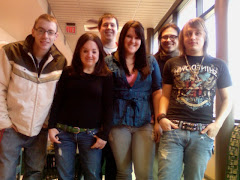
•Leader-centered/Group-centered control - This tension lies with leadership problems. The leader of the group may or may not be respected among the other members, and there may be somewhat of a battle for a leader to emerge. The overall goal of the leader is to make sure the group has control of the task, but first they must take control of the group. This can be easier said than done and sometimes you may not make everyone happy in the process. One participant in the study had this interesting quote: "Sometimes you have to be more controlling than you want to be, [because] there’s nothing more frustrating to a group, in my personal opinion, than to allow them to flounder and wander around."

•Task-Nontask concerns - This tension is about group members' need for staying on task, while at the same time having ample down-time to enjoy themselves. This can be tricky at times for the leader because there is an unsteady balance between the two. Giving members too much time to digress may aggravate members who feel their time is being wasted, while too little down time may stress the group out or overwork them. As it was stated in the study, allowing members enough free time while in the group setting allows new ideas to "germinate."
•Process-Outcome focus - There is also a tension between the final outcome of the group task and how the group members get there. As we have discussed in our Small Group Communication class, even being in the most awful groups can result in a learning experience. In the end the journey is just as important as the destination.
These three types of dialectical tensions exsist in most groups. They are not necessarily negative tensions, but they do exsist, and being able to identify them can make you a more effective leader or group member.
Have you ever had a group leader who took too much or too little control? How did that effect your group as a whole?
Sources:
Gloria J. Galanes, 2009. Dialectical Tensions of Small Group Leadership. Communication Studies. http://web.ebscohost.com/ehost/detail?vid=3&hid=103&sid=3fe28581-2daa-442f-a0e6-8f157842ec69%40sessionmgr113&bdata=JnNpdGU9ZWhvc3QtbGl2ZSZzY29wZT1zaXRl#db=a9h&AN=44874249

The type of dialectial tension that I have experienced most often in working with small groups is by far the leader-centered/group centered control tension. In the past I've worked with group leaders that would have insane power trips and need to be in complete control of everything pertaining to what was happening in the group. The result of that would be us group members giving the leaders less respect and wanting to take the control. This just drew more need for the leader to control everything. It was like a back and forth power struggle. Out of the three types which do you experience the most?
ReplyDeleteThe blog addressed three ideas and explained two of three concepts sufficiently. A little more explanation of “Process-outcome focus” and possible practical application would be beneficial. These tensions that you have brought up in you for post can cause real hardships for a group and limits its productivity and/or effectiveness. While the post seems to place some heavy responsibility on the leader, the leader may be trying everything he or she knows what to do, it may be on the members.
ReplyDeleteI like how everything is simple to read and spaced nicely. I wish there was a little more on Process-Outcome though. The questions posed at the end made me think about how it relates to me and gives it more emphasis.
ReplyDelete